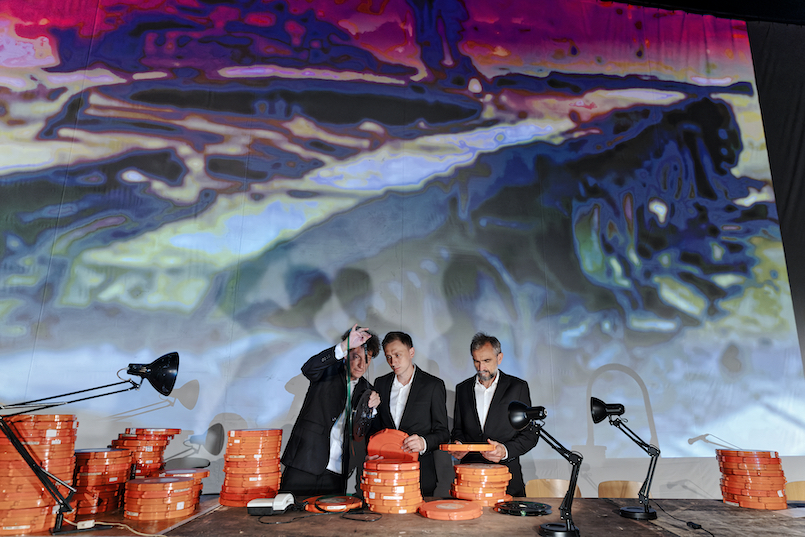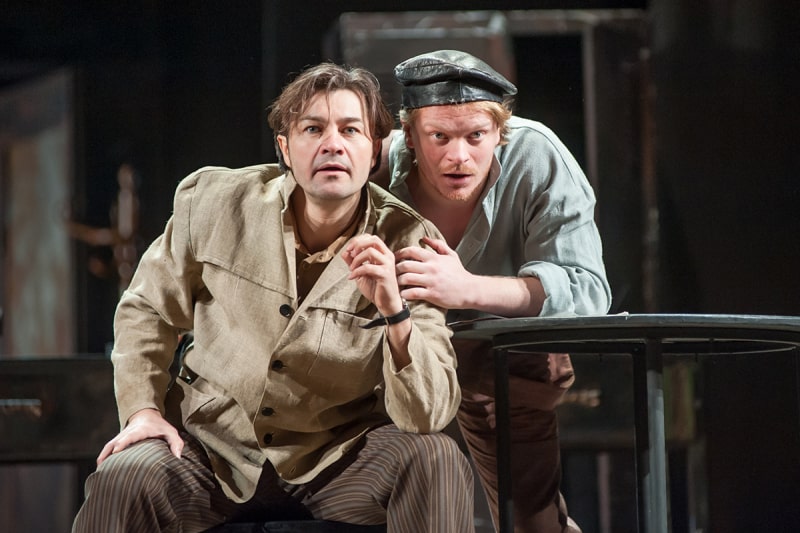On February 23, all the Ukrainian theatres held their rehearsals and performances, made some regular plans for tomorrow, closed their doors and people went home. The next day was the war. On the morning of February 24, regardless of their jobs, the Ukrainians forgot the lives they had before. Explosions of the Russian missiles hitting the Ukrainian land put the end to the peaceful days and the sound of the barbells was replaced by the air raid sirens. Theatres were shut down due to the implementation of martial law. No performances were allowed, but instead, theatres served as shelters in Eastern Ukraine and as humanitarian hubs in Western Ukraine. Lviv Les Kurbas Theatre and Lesia Ukrainka Theatre accommodated people who fled from Russian bombs in their hometowns. In addition, theatre employees prepared food and went to the train station to feed people who had arrived in Lviv from other cities. Lviv Maria Zankovetska National Theatre received humanitarian aid from European countries and sorted it right on the stage, actors along with volunteers knitted camouflage nets, sewed clothes for the Armed Forces of Ukraine, organized concerts for internally displaced children and „creative therapy“ sessions for adults. Although Eastern Ukraine was heavily bombed and the Russian army went East and North, the theatres there were also actively volunteering, distributing humanitarian aid to the people in need, and being close to the battlefields.
On the first days of the full-scale war, a lot of actors joined the Armed Forces of Ukraine and the ranks of territorial defense. Pasha Lee was among them who helped with the evacuation of people from Kyiv suburbs where the Russian army was torturing the civilians. He was shot and killed with a Russian bullet after he gave his bullet-proof vest to the child he was evacuating. Oleksa Kravchuk who was the head of the Lviv theatre ‘People and dolls’ during the peaceful times, was defending Ukraine in the East when the huge explosion near his blindage made it collapse, and he was stuck under the logs. Fortunately, he is alive. His ribs were broken and now he is recovering. Ukrainian and Crimean Tatar film and theatre actor and director Akhtem Seitablaiev is the head of the media relations service of the 241st separate brigade of the Ukrainian Armed Forces now. Olesia Vorotniuk – ballerina of the Ukraine National Opera was in territorial defense first and then became a medical staff member. Former Ukraine’s minister of culture and an actor of Kyiv Ivan Franko National Drama Theatre Yevhen Nyshchuk joined the volunteer battalion, where an air intelligence group was later created. His colleague, actor Oleksandr Pecherytsia performs combat tasks in the Kharkiv region. Both actors play together in two performances – ‘Stolen happiness’ by Ivan Franko and ‘Three comrades’ by Erich Maria Remarque (Yevhen performs Robert Lokamp’s role, Oleksandr – Gottfried Lenz). We can only imagine how their performances of Remarque’s roles will change after experiencing the war as it is.

Lviv Maria Zankovetska National Theatre stage full of humanitarian aid; photo: Facebook page of the theatre
At the beginning of April, when it was clear that the war would not end any time soon, the Ministry of Culture and Information Politics decided to open theatres where it was possible. So, the theatres (mostly in Western Ukraine) started to come back to the art life, not abandoning volunteering. The whole country is united in our goal to help our Armed Forces. Theatres made it free for the soldiers to attend the plays; actors hold performances for the military; charitable events take place in art venues. Ukraine’s artists reconsidered their views on the drama choice and excluded Russian drama works from theatres’ repertoires. Famous Kyiv National Lesia Ukrainka Russian Drama Theatre is no longer Russian Drama, and it also switches to the Ukrainian language in its performances. This theatre is lucky to have an underground metro station close to it, where people can shelter if the air raid alert interrupts the performance, so its building hosts the main stage plays of Kyiv Ivan Franko National Drama Theatre and some independent performances.
In the cities of Eastern Ukraine where there is no metro, many people sheltered from the Russian fire shelling in the theatre basements. On March 16 the Russian armed forces bombed the Drama Theatre in the besieged city of Mariupol with a direct strike. It was the largest single air raid shelter in the city, sheltering 500 to 1,200 civilians, and at the time of the attack it contained only women with children and the elderly; there was a text ‘children’ written with capital letters to be seen from the sky in front and behind the building. Some reports say there might have been over 600 casualties.
The Russians are not only deliberately destroying the Ukrainian cultural objects; on March 23 they kidnapped the head of Mykola Kulish Drama Theatre in temporarily occupied Kherson. Oleksandr Knyha is a chairman of the Eurasian Theatre Association, president of the Melpomene Tavria International Theatre Festival, and a member of the Kherson Regional Council. He was released after the Ukrainian cultural community spoke publicly about the kidnapping addressing world cultural organizations.
The above-mentioned festival Melpomene Tavria could not take place in Kherson because of the occupation, so it was decided that the participants would show their plays online. More than 60 theatres from 24 cities and 11 countries took part in the festival.
Since artistic activity in Ukraine is only partially possible, many artists look for international projects; some theatres go abroad and demonstrate their performances there. Kyiv Left Bank Theatre headed by well-known director Stas Zhyrkov went on tour with the “Bad roads” performance (directed by Tamara Trunova) telling the stories about the Russian invasion of Donetsk and Luhansk regions in 2014. It was staged in 2018 and won several awards since then (originally “Bad roads” is the war drama by Natalia Vorozhbyt who later directed a film based on the play. It is the winner of the Verona Film Club Award at the Venice Film Festival). The shows were attended by the Ukrainian people who fled abroad and the Europeans willing to know more about the war. The cities of Latvia, Lithuania, the Czech Republic, and Germany hosted the performances. And now Stas Zhyrkov with Pavlo Arie, the dramaturg and writer, manage the German Schaubühne premiere “To Take Arms against a Sea of Troubles” – a project that brings together two actors from Kyiv and an actor from the Schaubühne and explores the cost of war for an artist. What does it do to your body and your mind to handle a weapon? What does it mean to take up a rifle or a gun, objects designed to inflict damage and to destroy – especially if one’s own life has been focused on imagining and creating fictional worlds? (details)
Under the conditions when it was impossible to perform on a stage, many Ukrainian artists became volunteers to raise funds and buy military equipment. Maryna Koshkina, Kyiv Ivan Franko National Drama Theatre actress, volunteered at the Lviv railway station for a couple of months helping people who arrive there. After returning to Kyiv, she founded her own charity organization “МУР” (Artistic Ukrainian Movement) aiming to help talented children, artists, and the Armed Forces of Ukraine. The organization has held several charity art events uniting the Ukrainian artists who have provided mentorships and shared their thoughts and experiences about the art generally and during wartime.
Nevertheless, Ukraine is experiencing the toughest time of its modern history, the Ukrainians stay united and single-minded in our belief in victory over the enemy. But all of us wish for the day to come when we will go to the theatre without fear of air strike to see our artists all alive and cheerful. Though, while defending our country we can confidently say that our Muses are not silent. Our Muses are holding guns and wearing bullet-proof vests.
Mariya Shyshkevych, ProТеатр, September 5, 2022





